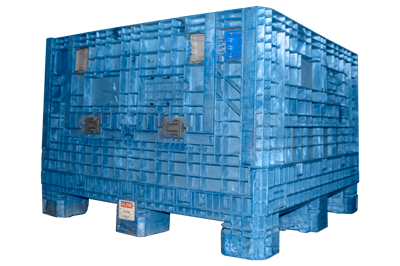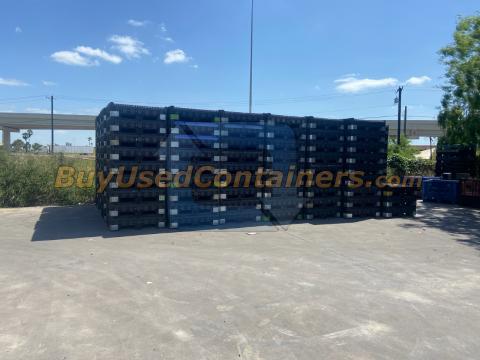How used collapsible bulk containers support cost-effective operations
Wiki Article
The Ultimate Guide to Choosing the Right Mass Containers for Your Business Requirements
Selecting the ideal mass containers is important for any kind of organization that depends on efficient logistics. Different kinds of containers exist, each created for specific materials and applications. Variables such as dimension, material compatibility, and governing standards play a considerable role in this decision-making procedure. Understanding these elements can cause enhanced functional performance. However, numerous organizations overlook necessary elements that could enhance their total performance and sustainability. What are these factors to consider?Understanding Different Sorts Of Mass Containers
Mass containers serve as crucial tools for organizations seeking efficient storage space and transportation services. These containers are available in numerous types, each developed to satisfy details operational needs. One usual kind is the intermediate bulk container (IBC), which is excellent for granulated and liquid products, providing an equilibrium of capacity and ability to move. Another preferred option is the mass bag, or FIBC, ideal for completely dry, flowable items. These flexible containers are lightweight and can be easily carried and stored. For much heavier materials, rigid mass containers are typically employed, offering durability and stability for secure handling. Furthermore, there are customized containers customized for hazardous products, making certain conformity with safety and security guidelines. Comprehending the unique attributes of these bulk container types enables businesses to make enlightened choices that enhance logistics and lower costs. By picking the right container, business can improve their operational performance and streamline their supply chain processes.Key Material Considerations for Mass Containers
When selecting bulk containers, it is vital to ponder the products made use of in their building. Elements such as chemical, strength, and resilience compatibility play an essential function in making certain the containers satisfy specific operational demands. Additionally, weight and transportability concerns can influence both effectiveness and transport logistics.Product Resilience and Strength
Sturdiness and stamina are crucial variables in picking materials for bulk containers, as they directly affect the container's capability to endure different ecological problems and handling processes. Materials such as high-density polyethylene (HDPE), polypropylene, and stainless steel are typically preferred for their durable homes, using resistance to temperature level, abrasion, and impact fluctuations. The choice of product likewise influences the total life-span of the container; stronger materials normally lead to less regular substitutes, leading to set you back savings gradually. Additionally, the weight of the material can affect delivery expenses and convenience of handling. Services should consider their specific functional atmospheres and the capacity for deterioration to guarantee peak sturdiness and toughness in their bulk container option.Chemical Compatibility Factors
Recognizing chemical compatibility is crucial for picking mass containers, as the materials utilized must stand up to the certain materials they will certainly hold. Numerous elements influence compatibility, consisting of the chemical nature of the components, temperature level, and period of storage. For example, destructive chemicals may require containers made from stainless steel or specialized plastics that stand up to deterioration. Furthermore, reactive materials can produce warmth or gases, necessitating aired vent or pressure-rated containers. The selection of container product, whether polyethylene, polycarbonate, or metal, ought to align with the chemical buildings of the saved substances to avoid leaks or violations. Ultimately, a comprehensive examination of these compatibility aspects guarantees secure handling and storage space, securing both personnel and the setting while preserving product stability.Weight and Mobility Issues
Picking mass containers involves not only assessing chemical compatibility however additionally considering weight and portability. Organizations should examine the simplicity of handling and transportation to maximize efficiency. Lightweight products like high-density polyethylene (HDPE) or light weight aluminum can promote easier activity and decrease shipping costs. Conversely, heavier containers may supply boosted longevity however can hinder movement, particularly in settings requiring constant moving. Additionally, the style of the container should permit practical training and piling, ensuring ergonomic safety and security for workers. Firms must also take into consideration the facilities readily available for transport; for instance, containers suitable with forklifts or pallet jacks can improve operations. Inevitably, the best balance between weight and portability straight influences functional effectiveness and price performance.Sizing Your Mass Containers for Optimum Effectiveness
When sizing bulk containers, services should very carefully examine the measurements called for to accommodate their details products. Furthermore, weight capacity is a crucial variable that affects performance and safety and security during transportation and storage. Efficient sizing not only takes full advantage of space but also maximizes functional operations.Figuring Out Container Dimensions
Choosing the ideal measurements for bulk containers is essential for making best use of effectiveness in storage space and transportation. Companies have to assess their certain demands, considering variables such as available room, the nature of the products being saved, and the techniques of transportation used. Exact measurements guarantee that containers fit ideally in cars and stockrooms, minimizing wasted room and decreasing handling time. Standard dimensions can supply convenience, however custom dimensions may be needed for unique requirements or to fit particular items. Additionally, it is essential to examine stacking capabilities and ease of access, as these aspects affect total functional efficiency. Eventually, the best visit measurements cause enhanced organization and structured logistics, benefiting the general efficiency of the service.Weight Capability Considerations
Understanding weight capacity is important for businesses aiming to optimize their bulk container efficiency. The weight capacity of a container straight affects storage capabilities, transportation logistics, and total functional prices. Selecting containers with the proper weight limitations guarantees that companies can securely keep and deliver their items without running the risk of damages or compliance concerns. Overwhelming containers can bring about structural failures, while underutilizing ability results in wasted resources. When choosing containers, it is essential for businesses to examine their product weights and take into consideration any type of regulative demands. In addition, variables such as the type of product, planned use, helpful resources and ecological conditions need to likewise affect weight capacity choices. By assessing these elements, companies can enhance performance and assure a structured supply chain.Regulatory Conformity and Safety And Security Criteria

Governing compliance and safety standards play an essential function in the option of bulk containers for companies. Organizations must assure that their containers meet various laws established by local, nationwide, and worldwide authorities. These requirements frequently refer to material safety and security, structural stability, and appropriate labeling, which assist prevent crashes and assure the risk-free transportation of goods.
In addition, adherence to industry-specific standards, such as those from the Fda (FDA) or the Occupational important link Security and Health Management (OSHA), is vital for firms handling unsafe materials or food items. Non-compliance can lead to fines, lawful problems, or damages to a business's track record.
Organizations need to also consider the container's compatibility with the products being kept or transferred to avoid contamination or chain reaction (refurbished bulk containers). To summarize, recognizing and carrying out governing conformity and safety and security standards is important for the accountable and reliable use mass containers
Sustainability Choices for Eco-Friendly Bulk Containers

Firms are also discovering alternatives made from recycled materials, which not just preserve resources yet also support the recycling sector. Moreover, innovations in layout permit lighter containers that require much less energy to transport, better improving sustainability. By integrating these environmentally friendly mass container alternatives, organizations can demonstrate their commitment to environmental stewardship while satisfying customer need for lasting methods. This shift not only aids the earth but can likewise improve brand reputation and customer loyalty.
Cost-Effectiveness and Budgeting for Bulk Containers
While many services concentrate on sustainability, cost-effectiveness remains a critical element when picking mass containers. Organizations should assess the initial acquisition price, as well as long-lasting operational prices, to ensure monetary stability. Elements such as reusability, durability, and upkeep play a substantial role in identifying general expenses.Buying top quality containers might produce higher ahead of time costs however can result in savings via lowered substitute rates and reduced waste. Furthermore, companies must think about transport costs and storage efficiency, as these can impact the general budget plan.

Frequently Asked Concerns
Just how Do I Figure Out the Right Container for Hazardous Products?
To figure out the ideal container for hazardous materials, one need to evaluate compatibility with the substance, consider the container's product, look for governing conformity, and analyze capacity and security features to ensure correct handling and storage.Can Mass Containers Be Customized for Specific Products?
Yes, bulk containers can be tailored for details products. used plastic containers. Different functions, such as layout, material, and size, can be tailored to fulfill distinct requirements, ensuring excellent safety and efficiency for transferring and storing various productsWhat Is the Average Lifespan of Various Mass Container Types?
The typical lifespan of mass container kinds differs; plastic containers last 5-10 years, metal containers 10-20 years, and wooden containers normally last 3-7 years, relying on use, upkeep, and environmental problems.Just how Should I Clean and Maintain Mass Containers?
To clean up and preserve bulk containers, one ought to on a regular basis inspect for damage, eliminate deposit, wash with suitable detergents, wash thoroughly, and guarantee proper drying out prior to storage. Complying with manufacturer guidelines boosts long life and security during usage.Exist Rental Options for Mass Containers Available?
Yes, various companies supply rental options for mass containers, offering adaptability for organizations. These services can fit various requirements, enabling companies to manage inventory effectively without the dedication of purchasing containers outright.Sturdiness and toughness are important variables in selecting materials for bulk containers, as they straight influence the container's capability to endure various environmental problems and dealing with procedures. Comprehending chemical compatibility is necessary for picking mass containers, as the products made use of need to resist the particular substances they will certainly hold. Comprehending weight ability is vital for organizations intending to enhance their bulk container efficiency. Governing compliance and safety and security criteria play a vital function in the choice of bulk containers for organizations. While many organizations focus on sustainability, cost-effectiveness remains an important aspect when selecting bulk containers.
Report this wiki page